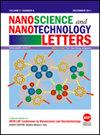Synthesis of Gold Nanoparticles in Cyclodextrin-Tetrachloroaurate System
引用次数: 1
Abstract
Tetrachloroaurate reduction with α-, β-, and γ-cyclodextrin at pH 10.56 was studied in this study by dual-angle dynamic light scattering and spectrophotometry. The nanoparticles were also characterized by scanning electron microscopy. In contrast with our previous study, the nanoparticles were purified by centrifugation prior to characterization. The reaction is considered to be a promising one-step method for preparation of gold nanoparticles with immobilized cyclodextrins without the need for seeding. Unlike in our previous study, the reaction mixture was boiled under reflux conditions instead of an open vial. This change sped up the reaction, and extensive aggregation was avoided. For the first time, this study demonstrated that all three cyclodextrins were able to reduce tetrachloroaurate at room temperature as well, but long incubation periods were necessary. This is the first publication discussing the mechanism of tetrachloroaurate reduction by cyclodextrins. The first stage of the reaction involved tetrachloroaurate hydrolysis despite presence of hydrochloric acid in the commercial preparation of tetrachloroauric acid (HAuCl4). Tetrachloroaurate was therefore the precursor but not the actual oxidant. The previous hypothesis on autocatalytic decarboxylation of cyclodextrins was therefore proven wrong. Particle growth was accompanied by nucleation, leading to coexistence of nanoparticles and nanoclusters. The resulting nanoparticles contained a small fraction of aggregates, probably because of sodium chloride generated from hydrochloric acid. However, besides playing this detrimental role, chloride ions facilitated nucleation by stabilizing gold intermediates. The nanoparticles solutions could be stored at least for three months, which contrasted with our previous work, where the nanoparticles were stable for only three days. For the first time, freeze-drying and reconstitution of the resulting nanoparticles were investigated, and they were shown to be free from aggregation. The synthesized gold nanoparticles are recommended for use as drug carriers.环糊精-四氯酸盐体系中纳米金的合成
采用双角动态光散射和分光光度法,研究了在pH 10.56下α-、β-和γ-环糊精对四氯桂酸盐的还原作用。用扫描电镜对纳米颗粒进行了表征。与我们之前的研究相反,纳米颗粒在表征之前通过离心纯化。该反应被认为是一种很有前途的一步法,可以在不需要播种的情况下用固定化环糊精制备金纳米颗粒。与我们之前的研究不同,反应混合物在回流条件下煮沸,而不是在打开的小瓶中。这种变化加快了反应速度,避免了广泛的聚集。这项研究首次证明了所有三种环糊精都能在室温下还原四氯酸盐,但需要很长的潜伏期。这是讨论环糊精还原四氯酸盐机理的第一篇论文。反应的第一阶段涉及四氯金酸水解,尽管在四氯金酸(HAuCl4)的商业制备中存在盐酸。因此四氯酸盐是前体而不是氧化剂。因此,先前关于环糊精自催化脱羧的假设被证明是错误的。颗粒的生长过程伴随着成核,导致纳米颗粒和纳米团簇的共存。由此产生的纳米颗粒含有一小部分聚集体,可能是因为盐酸产生的氯化钠。然而,除了这一不利作用外,氯离子还通过稳定金中间体来促进成核。纳米粒子溶液可以储存至少三个月,这与我们之前的工作形成对比,纳米粒子只能稳定三天。首次研究了冷冻干燥和重组得到的纳米颗粒,结果表明它们没有聚集。建议将合成的金纳米颗粒用作药物载体。
本文章由计算机程序翻译,如有差异,请以英文原文为准。
求助全文
约1分钟内获得全文
求助全文
来源期刊

Nanoscience and Nanotechnology Letters
Physical, Chemical & Earth Sciences-MATERIALS SCIENCE, MULTIDISCIPLINARY
自引率
0.00%
发文量
0
审稿时长
2.6 months
 求助内容:
求助内容: 应助结果提醒方式:
应助结果提醒方式:


